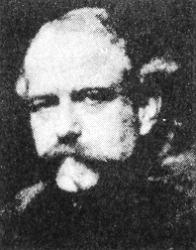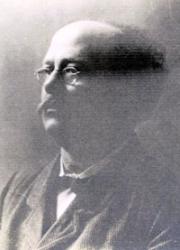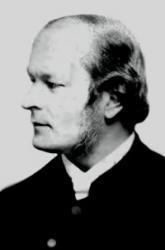Planning worship?
Check out our sister site, ZeteoSearch.org,
for 20+ additional resources related to your search.
- |
User Links
Person Results
Arthur Henry Brown

1830 - 1926 Person Name: Arthur H. Brown Composer of "[In the field with their flocks abiding]" in In Excelsis Gloria Born: July 24, 1830, Brentwood, Essex, England.
Died: February 15, 1926, Brentwood, Essex, England.
Almost completely self taught, Brown began playing the organ at the age 10. He was organist of the Brentwood Parish Church, Essex (1842-53); St. Edward’s, Romford (1853-58); Brentwood Parish Church (1858-88); St. Peter’s Church, South Weald (from 1889); and Sir Anthony Browne’s School (to 1926). A member of the London Gregorian Association, he helped assemble the Service Book for the annual festival in St. Paul’s Cathedral. He supported the Oxford Movement, and pioneered the restoration of plainchant and Gregorian music in Anglican worship.
Brown edited various publications, including the Altar Hymnal. His other works include settings of the Canticles and the Holy Communion Service, a Children’s Festival Service, anthems, songs, part songs, and over 800 hymn tunes and carols.
Music:
Alleluia! Sing the Triumph
Arthur
Dale Abbey
Fields of Gold Are Glowing
Gerran
Holy Church
Holy Rood
If Angels Sang Our Savior’s Birth
Lammas
O, Sing We a Carol
Purleigh
Redemptor Mundi
Ring On, Ye Joyous Christmas Bells
Saffron Walden
St. Anatolius
St. Austell
St. John Damascene
St. Mabyn
St. Sophronius
Story of the Cross
Sweet Child Divine
--www.hymntime.com/tch
Arthur Henry Brown
W. H. Neidlinger

1863 - 1924 Composer of "[In the field with their flocks abiding]" in Primary Teachers' Manual William Harold Neidlinger USA 1863-1924. Born at New York, NY, he studied with organists Dudley Buck and C C Muller (1880-90) in New York. He played the organ at St Michael’s Church in New York City. He also conducted the Amphion Male Chorus and the Cecilia Women’s Chorus in Brooklyn, and the Treble Clef Club and Mannheim Glee Club in Philadelphia, PA. He taught in the music department of the Brooklyn Institute of Arts & Sciences. He went on to study with E Dannreuther in London (1896-98) then worked in Paris as a singing teacher until 1901. In 1897 he married Alice Adelaide Maxwell Sypher, and they had a son, Harold. Returning to American in 1901, he settled in Chicago, IL, where for several years he was one of the prominent singing teachers. He wrote music for a religious mass, He published a comic opera, Ulysses” in 1898, another opera, “Sweet Anne Page” (1903), a cantata, “Prayer, praise, and promise”. two song books, “Songs of the campfire girls of America”, and “Small songs for small singers” (1896), a standard work for kindergartens, that was so successful that he.became interested in child psychology and nearly abandoned music. He even established a school for handicapped children in East Orange, NJ, where he taught his theories of musical pedagogy and speech and vocal therapy. He wrote several secular songs and edited a number of vocal songbooks, especially for children. He was a theorist on musical methods and education. He died at Orange, NJ. He was an author, composer, and lyricist.
John Perry
W. H. Neidlinger
John Farmer

1836 - 1901 Person Name: J. Farmer Composer of "[In the field with their flocks abiding]" in Northfield Hymnal Born: August 16, 1835, Nottingham, England.
Died: July 17, 1901, at his home in Oxford, England.
Buried: St. Sepulchre’s Cemetery, Jericho, Oxford, England.
Eldest child of butcher John Farmer and milliner Mary Blackshaw Farmer, John learned to play the piano, violin, and harp when young. He was apprenticed to his uncle Henry Farmer, an organist, composer, and music teacher with a music and musical instrument business in Nottingham. At age 14, John went to study at the Leipzig Conservatory, then three years later under Andreas Spaeth in Coburg for a year. He returned to England in 1853, and entered his father’s lace business. After his mother’s death in 1856, he went to Zürich, Switzerland, where he taught music. He returned to England again in 1861, and became music master of Harrow School in 1864, staying there until 1885. He then accepted an invitation to become organist at at Balliol College, Oxford, where he founded the Balliol Concerts.
During his career, Farmer composed oratorios, cantatas, church music, chamber music and numerous school songs, especially for Harrow School. One of his best known compositions was "Forty Years On," which he wrote at Harrow in 1872. While at Balliol, he composed Warwick School’s first school song, "Here’s a Song For All", in 1892. His other works include:
Cinderella
The oratorio Christ and His Soldiers
The cricketing song "Willow the King"
Music: FARMER
© The Cyber Hymnal™ (www.hymntime.com/tch)
John Farmer
Frederick W. Farrar

1831 - 1903 Person Name: F. H. Farrar Author of "Glory to God in the highest" in The Church Hymnal Farrar, Frederic William, D.D., son of the Rev. Charles Penhorn Farrar, sometime a missionary in India, and late Rector of Sidcup, Kent. He was born at Bombay, Aug. 7th, 1831; and educated at King William's College, Isle of Man, and at King's College, London. In 1850 he obtained a classical exhibition, and in 1852 a scholarship at the University of London, whence, after taking the degree of B.A., he passed to Trinity College, Cambridge. There, in 1852, he took (with other prizes) the Chancellor's Prize in English verse, and graduated in first-class classical honours in 1854. In the same year he entered Holy Orders, and was subsequently for some time an assistant master at Harrow School. In 1871 he was appointed to the head mastership of Marlborough College, which he held until 1876, when he was nominated a Canon of Westminster Abbey and Rector of St. Margaret's, Westminster. He had previously been chosen Select Preacher before the University of Cambridge in 1868, and again in 1874, 1875, and Hulsean Lecturer in 1870. He was also appointed in 1869 a Chaplain to the Queen, and in 1883, Archdeacon of Westminster. Archdeacon Farrar has achieved a high reputation both as a writer and a preacher.
He is the author of some volumes of fiction for the young which soon attained great popularity, as well as of several important works in the departments of philology and theology. Of the latter, his Life of Christ and Life and Work of St. Paul are the best known. As a preacher, Archdeacon Farrar stands in the first rank as a master of graceful eloquence. His contributions to hymnody include, "Father, before Thy throne of light," "God and Father, great and holy," and a beautiful carol, "In the fields with their flocks abiding." [George Arthur Crawford, M.A.]
--John Julian, Dictionary of Hymnology (1907)
==================
Farrar, F. W. , p. 365, ii. Dr. Farrar became Dean of Canterbury in 1895, and died at Canterbury, March 22, 1903. His Life, &c, by his son, was published in 1904.
--John Julian, Dictionary of Hymnology, New Supplement (1907)
Frederick W. Farrar


 My Starred Hymns
My Starred Hymns

